新视野大学英语第三版第一册Unit5中
新视野大学英语第一册第五单元第三版

outrun- run faster than
Eg: When we were little, he always outran me. outgrow, outstand, outeat, outfight, outlive, outguess看透,outgo,
Para. nine
a wide lead:大幅领先 smash/break a record: 打破纪录 in that instant: 在那一瞬间
What sports are the people in the pictures doing?
Items
Warm up Qs
What sports do you love to play? How much time do you spend on sports every day? Do you think playing sports is important to students?
Reading
Qs ---page126
Detailed study of the text
Sentence structures, phrases, grammar points, etc.
Para one
1. Considered one of…regardless of their age. Meaning: The 875-kilometer Australian race, which starts from Sydney and ends in Melbourne and takes place once a year, is regarded as one of the most difficult longdistance races in the world. It is a tough test of one’s ability to continue running over a long period of time. Even the world’s best athletes, young or old, find the race extremely difficult.
新视野大学英语(第三版)Unit 5_单词解释+例句
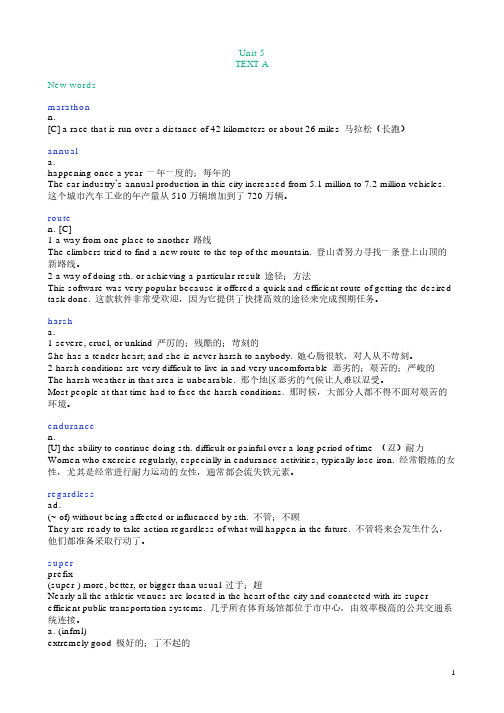
Unit 5TEXT ANew wordsmarathonn.[C] a race that is run over a distance of 42 kilometers or about 26 miles 马拉松(长跑)annuala.happening once a year 一年一度的;每年的The car industry’s annual production in this city increased from 5.1 million to 7.2 million vehicles. 这个城市汽车工业的年产量从510万辆增加到了720万辆。
routen. [C]1 a way from one place to another 路线The climbers tried to find a new route to the top of the mountain. 登山者努力寻找一条登上山顶的新路线。
2 a way of doing sth. or achieving a particular result 途径;方法This software was very popular because it offered a quick and efficient route of getting the desired task done. 这款软件非常受欢迎,因为它提供了快捷高效的途径来完成预期任务。
harsha.1 severe, cruel, or unkind 严厉的;残酷的;苛刻的She has a tender heart; and she is never harsh to anybody. 她心肠很软,对人从不苛刻。
2 harsh conditions are very difficult to live in and very uncomfortable 恶劣的;艰苦的;严峻的The harsh weather in that area is unbearable. 那个地区恶劣的气候让人难以忍受。
新视野大学英语读写教程第一册第三版Unit5TextA分析
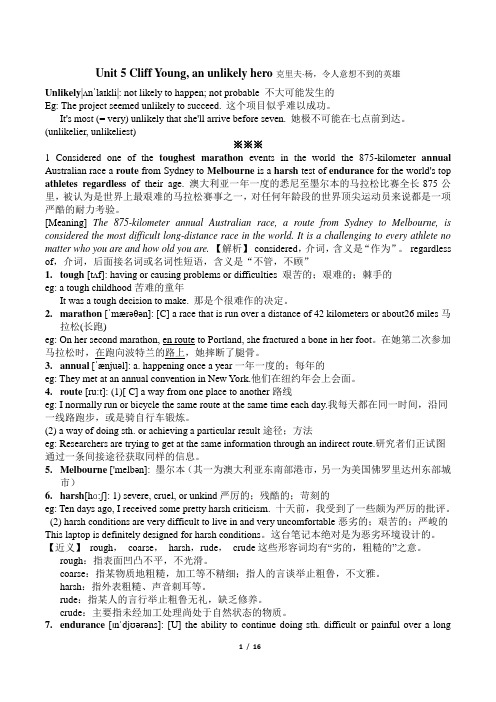
Unit 5 Cliff Y oung, an unlikely hero克里夫·杨,令人意想不到的英雄Unlikely|ʌnˈlaɪkli|:not likely to happen; not probable 不大可能发生的Eg: The project seemed unlikely to succeed.这个项目似乎难以成功。
It's most (= very) unlikely that she'll arrive before seven.她极不可能在七点前到达。
(unlikelier, unlikeliest)※※※1 Considered one of the toughest marathon events in the world the 875-kilometer annual Australian race a route from Sydney to Melbourne is a harsh test of endurance for the world's top athletes regardless of their age. 澳大利亚一年一度的悉尼至墨尔本的马拉松比赛全长875公里,被认为是世界上最艰难的马拉松赛事之一,对任何年龄段的世界顶尖运动员来说都是一项严酷的耐力考验。
[Meaning] The 875-kilometer annual Australian race, a route from Sydney to Melbourne, is considered the most difficult long-distance race in the world. It is a challenging to every athlete no matter who you are and how old you are.【解析】considered,介词,含义是“作为”。
新视野大学英语第三版第一册UNIT5课文翻译

UNIT5TESTA克里夫·杨,令人意想不到的英雄1 澳大利亚一年一度的悉尼至墨尔本的马拉松比赛全长875公里,被认为是世界上最艰难的马拉松赛事之一,对任何年龄段的世界顶尖运动员来说都是一项严酷的耐力考验。
体能超好的年轻选手在赛前要进行数月的训练,而且还和像耐克和阿迪达斯这样著名的赞助商签约,这些赞助商通过强大的资金和装备支持机制为选手提供资助和装备。
这项比赛历时七天,即使对那些为荣誉和奖金而赛的世界一流运动员来说,这项比赛也是对体能和力量的严峻考验。
2 1983年比赛那一天,克里夫·杨,一个牙齿已全部脱落的61岁的农民业余选手也来参加比赛。
他脚穿橡胶靴,年龄也比其他选手大得多。
没有人注意到这个外表古怪的老头,他就跟个隐身人差不多。
聚集的人群以为克里夫只是来观看比赛的。
当克里夫明确表示自己是来参赛的时候,他周围的世界级选手先是表示出明显的怀疑,继而予以鄙视。
显然,人们认为这只是媒体的炒作而已。
3 但是媒体记者颇为好奇,所以当克里夫领好自己的参赛号码,走进配备昂贵的特殊装备的参赛选手队伍时,镜头对准了他,聚集的记者们向他抛来一个又一个问题。
他们问:“你是谁?”“你来做什么?”4 “我是克里夫·杨。
我来自墨尔本郊外的一个大农场,我们在那里养羊。
”5 他们接着问道:“你为什么认为自己有能力参加这项比赛?跑完全程要花一周的时间,而且每晚的睡眠不足六个小时。
”6克里夫回答道:“我放羊时每一次都要跑上两三天。
这项比赛只是需要再多花几天而已。
我相信我可以做到。
”7 很快,马拉松比赛开始了,年轻的运动员把克里夫远远地甩在了后面。
人们笑了,有些人还大声地笑,因为克里夫甚至连跑步的姿势都不正确。
他跑步的样子怪极了,因为他似乎是在拖着脚走。
随着比赛的进行,体育解说员和观众们的注意力都放到了那些领先的选手身上。
想象一下第二天早上看到新闻报道说克里夫还在比赛的队伍里时,人们有多么惊奇!不仅如此,他还彻夜未眠,一直在跑。
新视野大学英语第三版第一册Unit5教案
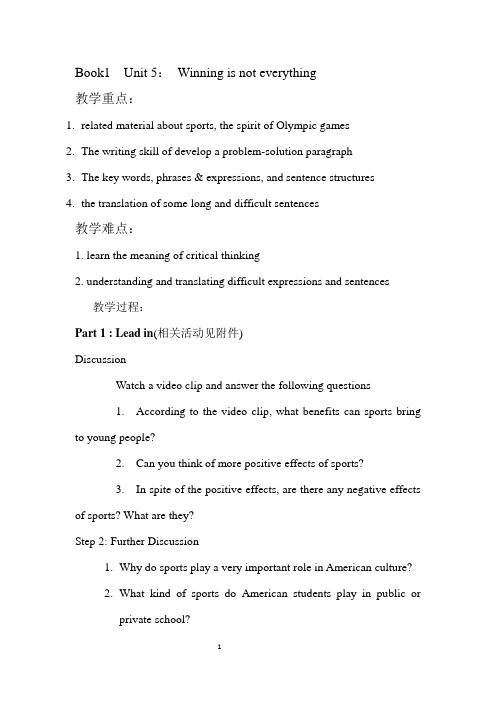
Book1 Unit 5:Winning is not everything教学重点:1.related material about sports, the spirit of Olympic games2.The writing skill of develop a problem-solution paragraph3.The key words, phrases & expressions, and sentence structures4.the translation of some long and difficult sentences教学难点:1. learn the meaning of critical thinking2. understanding and translating difficult expressions and sentences教学过程:Part 1 : Lead in(相关活动见附件)DiscussionWatch a video clip and answer the following questions1. According to the video clip, what benefits can sports bring to young people?2. Can you think of more positive effects of sports?3. In spite of the positive effects, are there any negative effects of sports? What are they?Step 2: Further Discussion1.Why do sports play a very important role in American culture?2.What kind of sports do American students play in public orprivate school?3.According to your understanding, what kind of sports doAmerican like most?4.. How much do you know about traditional Chinese Kung fu?Share your knowledge in class.Have you ever watched any “Kong fu movies” made by Westerners? According to your understanding, what is Kung fu in their eyes? Do they have the same feeling toward Kung fu as we Chinese?Part 2 while readingText structure analysis :This article is mainly about the benefits that sports can bring to young people.. The passage can be roughly divided into four parts.1.Part 1( Para 1): Mental and physical health of young people isimportant and it should be the goal of parents, teachers andcoaches in cultivating the young.2.Part 2 ( Para. 2-5): How do team sports work in molding youngpeople of mental and physical health?Para.2: Team sports provide the young with critical skills andvaluable lessonsPara.3: Team sports give the young a natural place to work hardand learn valuable life lessons.Para.4: In team sports, what matters is whether you are fullyinvolved, not your natural ability.Para.5: Team sports can inspire and encourage the less naturally talented athletes to be their best. What they learn on theplaying field will be valuable to them in their career andtheir personal lives.3.Part 3 (Para.6) Participation in competitive team sports is notwithout hazards. Placing excessive emphasis on winning willlead to missing the learning opportunities, uncovering negative,draining and harmful consequences and canceling out the manydesirable effects of sports.Part 4 (Para. 7): Conclusion: The writer further concludes the benefits of team sports and stresses the importance of all the benefits.III. Detailed studies of the text and sentence structureQuestions Previewing1.What is the text mainly about?2.What attributes can team sports provide to growing children? (Para.2)3.What does the author want to illustrate by mentioning lemons andhoney? (Para. 3)4.How can talented people benefit from team sports? (Para. 4)5.What will those who lack talent learn through sports? (Para. 5)6.What could be the consequences when too much emphasis is puton winning according to the text? (Para. 6)Sentence Interpretation1.原句:The ability to work toward a common goal underlines the value ofteamwork. (Para. 2, L3)show that sth. is important解释: The ability to work toward the same goal shows how important the value of teamwork is.译文:年轻人为了一个共同目标而努力的能力更加凸显了团队合作的价值。
新视野大学英语(第三版)读写教程Unit 5
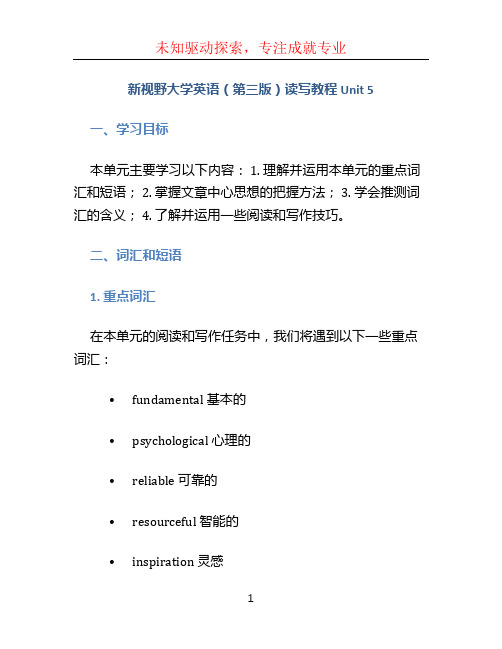
新视野大学英语(第三版)读写教程Unit 5一、学习目标本单元主要学习以下内容: 1. 理解并运用本单元的重点词汇和短语; 2. 掌握文章中心思想的把握方法; 3. 学会推测词汇的含义; 4. 了解并运用一些阅读和写作技巧。
二、词汇和短语1. 重点词汇在本单元的阅读和写作任务中,我们将遇到以下一些重点词汇:•fundamental 基本的•psychological 心理的•reliable 可靠的•resourceful 智能的•inspiration 灵感•comprehension 理解•obstacle 障碍•concentrate 专注•motivate 激励•activate 激活•perseverance 毅力•creativity 创造力2. 重点短语在本单元中,我们还将涉及以下一些重点短语:•take for granted 认为理所当然•set goals 设定目标•break down 分解•stand out 突出•come up with 提出•figure out 弄清楚•put in the effort 花费努力•think outside the box 跳出思维定式•give up 放弃•make the most of 充分利用三、文章中心思想的把握方法在阅读本单元的文章时,了解作者想要表达的中心思想是非常重要的。
下面是一些帮助你把握文章中心思想的方法:1.阅读标题和副标题:了解文章主要讨论的话题和角度。
2.阅读介绍和结尾:作者常常在文章的开头和结尾暗示文章的中心思想。
3.注意段落的开头和结尾:通常在段落的开头和结尾,作者会写下主要观点,以引导读者理解文章的中心思想。
4.寻找重复和关联词:在文章中,一些重复的词语和关联词能帮助你找到作者的中心思想。
5.总结段落的主题句:每个段落通常都有一个主题句,通过总结这些主题句,你可以把握整篇文章的中心思想。
四、推测词汇的含义在阅读本单元的文章时,你可能会遇到一些生词或不熟悉的词汇。
新视野大学英语第三版听说教程第一册Unit5答案
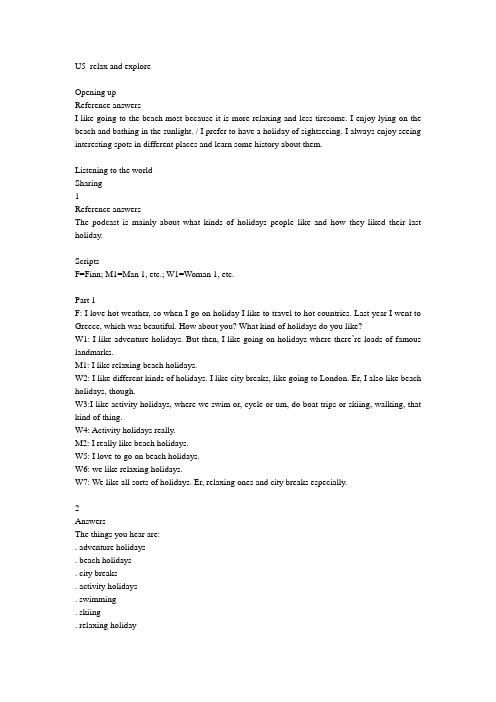
U5_relax and exploreOpening upReference answersI like going to the beach most because it is more relaxing and less tiresome. I enjoy lying on the beach and bathing in the sunlight. / I prefer to have a holiday of sightseeing. I always enjoy seeing interesting spots in different places and learn some history about them.Listening to the worldSharing1Reference answersThe podcast is mainly about what kinds of holidays people like and how they liked their last holiday.ScriptsF=Finn; M1=Man 1, etc.; W1=Woman 1, etc.Part 1F: I love hot weather, so when I go on holiday I like to travel to hot countries. Last year I went to Greece, which was beautiful. How about you? What kind of holidays do you like?W1: I like adventure holidays. But then, I like going on holidays where there’re loads of famous landmarks.M1: I like relaxing beach holidays.W2: I like different kinds of holidays. I like city breaks, like going to London. Er, I also like beach holidays, though.W3:I like activity holidays, where we swim or, cycle or um, do boat trips or skiing, walking, that kind of thing.W4: Activity holidays really.M2: I really like beach holidays.W5: I love to go on beach holidays.W6: we like relaxing holidays.W7: We like all sorts of holidays. Er, relaxing ones and city breaks especially.2AnswersThe things you hear are:. adventure holidays. beach holidays. city breaks. activity holidays. swimming. skiing. relaxing holidayScriptsPart 2F: Where did you go on your last holiday?M2: My last holiday was to the Cook Islands, and, um, I had a fantastic time. I just sat on the beach and did not (do) very much – read a couple of books, um, and went kayaking and did some other water sports.W5: The last holiday I went on was, um, to Bali, um, in Asia.W6: We went to Saint Lucia last year, where we had a relaxing holiday on the beach, reading our books and swimming.W4: We’ve got two young children, so our last holiday we went to Disneyland in Paris.M3: Last year I went to Australia with my mom and friends and that was pretty much a beach holiday. We were there for two and a half weeks and it was very good, very warm.W7: We went to New York, er, five ladies! Um, and it was the most wonderful place, wonderful theaters, er, wonderful nightlife and safe..W1: My last holiday, I went to Rome. Er, we saw the Coliseum, the Spanish Steps. Um, one night there was live opera there. .W3: our last holiday was a city holiday, and we went to New York and had a great time just before Christmas. We did lots of shopping and looking (looked) at all the sights. And once we’d had three days in, er, in New York, we then went to stay, to stay with friends up in Maine in New England.3Answers1.T2.He had a fantastic time.3.He went to Australia with his mom and friends for a beach holiday.4.T5.T6.They loved the wonderful city nightlife and it was safe.7.T8.She watched live opera there one night.9.She went to New York for a city holiday just before Christmas.10.TPart 3W2: Um, my last holiday, I went to France, to southern France, to see some friends of mine who live there.M1: the last holiday, I went to Mauritius and it was good. It was relaxing; it was a beach holiday. The food was fantastic – treat seafood – and the people were lovely.W1: They have really good food there. Amazing ice cream!W5: I thoroughly enjoyed, er, every minute.W6: Very relaxing. Lovely weather.M1: IT was a great place.W4: The boys really enjoyed it.M2: It was fantastic.4Answers1)relaxing2)fantastic3)lovely4)Amazing5)thoroughly enjoyed6)Lovely7)fantastic5.Reference Answers1)beach2)Xiamen, a famous city in southern China3)my good friends4) a week5)swam in the sea6)sunbathed on the beach7)lovely8)thoroughly enjoyedWhile you listenScriptsM: So, how do you usually travel? By plane or train?W: er… train. I think traveling by train is more comfortable than flying. And I don’t like flying. M: I put “plane” because flying is faster than going by train.W: Not always! OK, next question. Where do you like to stay: in a hotel or a self-catering apartment?M: In an apartment. And you?W: Hmm, in a hotel.M: Oh. But a hotel is more expensive than an apartment!W: Yeah, but it’s more comfortable. Hmm…next question. What do you prefer to do: to sightseeing or relax on a beach?M: Oh, that’s easy. I have beach holidays. Boring!W: OK – there’s one we answered the same. So we agree about that.M: Yeah, sightseeing’s definitely more interesting!W: Right. When do you like to go: in spring or summer?M: Er… in spring – I don’t really like hot weather. Tourist places are more crowded in summer. W: True. But the weather’s better. Summer is hotter than spring. I love hot weather.M: Well, we don’t agree there. Anyway, next question. What do you like to eat: local dishes or the food you usually eat?W: Local dishes, I think. You?M: Definitely! That’s two answers the same!W: Hmm, interesting. Next…what do you like to do in the evening? Go to a club or go to a restaurant?M: well, go to a restaurant.W: OH, good. Me, too. It’s much quieter than a club.M: Yes I agree. Restaurants are quieter…hmm, more relaxing.W: and the last question.. how long is your perfect holiday?M: er three months.W:5Answers1)19622)leave their cars at home3)public transport4)build5)keep in good condition6)19487)got in and drove away8)engineering problem9)too heavy10)strong11)private12)difficult to fly13)traffic problemsAfter you listen6I like the idea of the monorail in that people could get to work faster y monorail than by car. / I like the idea of the plane with a car that comes off because one can fly to a place and then drive his / her own car without bothering to rent a car. / I like the idea of the home helicopter because with a home helicopter one can fly directly to the place he / she wants to by taking the shortest route.7.Reference answersThe horseless sulky:. It can only hold two people.. It’s difficult to slow down.. It’s open to bad weather conditions.The Lightning Bug:. It’s very small.. It’s difficult to get in and out.8Reference answersStudent A: The Horseless Sulky was invented by an Italian in the 1930s. it is easy to turn and can go up to 190 kilometers per hour. It is also easy to get into and out of the Horseless Sulky. And it is easy to see things both on the left and on the right.Student B: The Lightning Bug was invented by an American in the 1930s. It can go up to 65 kilometers per hour. It is completely safe because it can stop I a very short time to avoid car crashes and it can’t turn over. The windows are made of plastic instead of glass so that passengers won’t get hurt.Student A: I think the Horseless Sulk is better than the Lightning Bug because it is so easy to get into and out of the Horseless Sulky, and it is easy to see things both on the left and on the right. In contrast, the Lightning Bug is very small and difficult to get in and out. Besides the Horseless Sulky can go so fast and it is three times faster than the Lightning Bug.Student B: I think the Lightening Bug is better than the Horseless Sulky. Although it does not go as fast as the Horseless sulky, it is completely safe because it can’t turn over and it can stop in a very short time to avoid car crashes. The windows are made of plastic instead of glass so that passengers won’t get hurt.ViewingBefore you view1Reference answers1.There is a computer problem in the control tower.2.It is mainly about how the passengers are feeling and how they spend their time waiting.While you viewScriptsP=presenter; W1=woman 1, etc.; M1=man 1, etc.Part 1P: Heathrow Airport is having a bad day. Hundreds of passengers can’t fly because of a computer problem in air traffic control. In Terminal 1, things are getting worse. More and more passengers are arriving. Some airplanes are leaving, but many flights are canceled. Everyone is hoping to find a flight. Some of the waiting passengers are having a snack while others are spending their timeoutside. It’s a hot summer day. Back inside the terminal, it’s getter hotter and hotter. Some people came here five hours ago.W1: I’m here with my grandmother and my parents and it’s terrible for us to wait here for such a long time now. we have to sleep at the airport because no hotel is available. S, it’s just terrible.M1: Have a look at this. Improvisation at its best. I’m glad they’re sleeping now. I was hoping to get to Berlin soon.P: People are still trying to find a flight.W2: I’ve had my son go on the Internet, my daughter be in one queue, me be in the other queue and on the mobile, all at the same time, trying to get to Amsterdam for 9:30 tomorrow morning.M2: After five hours queuing, you…you really become really Zen, you know…and here it’s pretty calm.2Answers1.queuing2.making phone calls3.pizza4.playing outside5.chess3AnswersA: 3, 5B:2C: 1,6D: 4ScriptsP=PresenterPart 2P: The airport managers find an interesting solution to one of the problems: garden chairs. With the chairs to relax in, some passengers are finding new ways to pass the time. Inside Terminal 1, it’s lae at night, after midnight. And many passengers are still here, waiting for their flight. Around 300 flights left Heathrow that day, but 319 flights were canceled, and over 500 people spent the night in the terminal.4.Answers1)airport managers2)relax3)pass the time4)midnight5)their flight6)3007)3198)500After you view5Reference answers1)Beijing2)terrible3)7 p.m.4) a computer problem in the control tower5)cancelled6)another flight7)queue/wait8)sleeping everywhere at the airport9)took off10)3 o’clock this morningSpeaking for communicationRole-playScriptsB=Boss; S=Secretary; D=David; G=GeorgeB: Where are the other people? We were supposed to start 15 minutes ago.S: Alex called and said he’s he here in a second. He said he got tied up with a customer.B: Tha t’s all right. I know what Alex’s customer is like.D: Morning, everyone! Please forgive me. I didn’t mean to come so late. I was just getting a cup of coffee at the coffee shop and the line was way too long. I had to wait for 20 minutes to get my coffee.B: David, this is not acceptable. If I say the meeting starts at 10, the meeting starts at 10. Not ten-o-one! And definitely not ten-twenty.D: Yes, sir. It won’t happen again, I promise.B: I hope so, David. All right. Let’s get started. So the first thing I want to talk about is our..G: I’m really sorry, everyone! I know I’m late. But really, it’s not my fault.B: OK, what’s the story this time, George?The railway service was delayed this morning. You know what happened? They say a train hit a cow that got onto the line between two stations…B: A cow? George, do you expect me to believe that?1Reference answers1.tied up; customer2.20; coffee3.Delayed; cow; stations2Reference answers.1.all right2.mean3.not acceptable4.won’t5.really6.not my fault31.X2.X3.T4.T5.X6.T7.T4Reference answers1.A: I’m terribly sorry. I didn’t mean to be so late for the party.B: It’s no big deal. We started the party just a few minutes ago.A: I went to buy this present for you. But when I was going to pay, the credit card machine broke down, and I didn’t have enough cash. I had to find an ATM machine to get some cash. So, I’m late.B: Tha t’s all right.A: I feel terrible. I should have brought the present earlier. But I was too busy to…B: Please don’t worry about it. And thanks a lot for the present!2A: Honey, I am so sorry that I am late.B: What happened?A: Well, actually I left home early, but the traffic was terrible. To make matters worse, when I was almost there, the road was blocked because of a car accident, so I had to walk three blocks to get here.B: You should have taken the subway. It’s Saturday.A: I forgot the traffic would be so bad on Saturdays. I’m terribly sorry to keep you waiting.B: Never mind. Next time remember not to take a bus here on Saturdays.3B: You are 10 minutes late.A: I’m really sorry, sir. I didn’t mean to be late for the interview. But someone jumped off the platform and the subway service was closed. So, I had to take a taxi to get here. Then I got stuckin a traffic jam! I’m sorry.B: all right then. Let’s start the interview.4B: Hi, this is Professor Robertson. How are you? I’m afraid you are 15 minutes late.A: Hi, Professor Robertson. It’s only 2:15. Shouldn't the appointment be at 3:00?B: well, no. we were supposed to meet at 2:00.A: Oh! Please forgive me! I thought it was 3:00 as usual. I forgot we had changed the time. I’m so sorry. Will you still have time for me if I arrive in 20 minutes?B: Yes, no problem.A: thank you so much. See you soon.B: You’re welcome. See you soon.Group discussionGet ideasScriptsA=attendant; P=passengerA: Your meal, sir.P: Thank you. Um excuse me.A: Yes, can I help you?P: hope so! I’m sorry, but there’s a small problem her. I ordered a vegetarian meal – but this is meat.A: Oh, just a moment. I checked and we don’t have a record of your order.P: What? But I always order vegetarian. I’m a frequent flyer.A: I Understand, sir. But we don’t have any more meals in business class.P: I don’t believe it! You always have extra meals in business class.A: Yes, but this is economy class.P: You don’t understand. Let me explain one more time. I don’t eat meat. I ordered vegetarian. I can’t fly to Tokyo without dinner. It’s your job to bring me a meal. A business class vegetarian meal is fine.A: Just a moment. Here you are, sir. A vegetarian meal.P: Thank you, but this is already open. And it’s cold. Um, can I speak to the person in charge, please.1Answers1) a vegetarian meal2)meat3)his order4)business class5)cold6)the person in charge2AnswersPassenger1.small2.don’t3.don’t understand4.one more time5.job6.speakattendant1.understand2.momentPresent ideas5Reference answersA: (To B, the child’s parent) Excuse me, Ma’am. I’d like to take a nap. It’s a long flight, you know, and I’m really tired. But I’m afraid your boy is a bit too noisy. Can you do something to quiet him down a bit, please?B: I’m terribly sorry. I’ve tried to stop him, but this is the first time traveling by plane and he feels uncomfortable. I’m sorry. I don’t know what to do. He’s just a little child after all…A: Yes, I understand. Maybe I should talk to the attendant and see if there’s anything she can do. (To C, the attendant) Excuse me?C: Yes, sir. What can I do for you?A: I’d like to move to a quitter seat so I can take a nap. The boy beside me just keeps screaming and it seems there is no way to quiet him down. Could you check for me if there is a vacant seat on this flight.C: Sure. I’ll go check for you. I’ll help you move to another seat as soon as I find a vacant one. A: Thank you.Problem 2A: (to B, the passenger who picks up A’s suitcase) Excuse me?B: Yes?A: Is that suitcase yours?B: Yes, of course. Anything wrong?A: I’m not sure, but I think it is mine. It looks exactly like mine.B: No way! This is mine. I know what my suitcase looks like.A: But I’ve been waiting for a long time and I haven’t seen my suitcase yet, so I couldn’t help wondering… Would you mind opening the suitcase to see what’s inside?B: This is my suitcase, and I’m not going to open it. Why should i?A: All right then. I’m going to call the airport staff to handle this for us.(to C, the airport staff) Excuse me. I’m afraid I need you help.C: Of course. What’s the problem, Ma’am?A: This gentleman has picked up a suitcase which I think belongs to me. I suggested we open it to see what’s inside, but he refused. Can you check for us?C: Yes, of course. (to B) May I open it, sir? Could you name some of the things you have in the suitcase.Problem3A: (To B, the guest next door) I can see you are having a party and I hate to disturb, but I’m staying next door and I can’t fall asleep with that noise coming out from your room. Could you quiet down a bit?B: Sorry, sir, but you see, this is the only night I spend here and it’s the only chance for me to meet my friends and have some fun together. Besides, it’s only half past nine. Isn’t it too early to go to bed?A: You don’t understand. I have to catch the six o’clock train tomorrow morning. So I have to get up really early.B: I’ll tell my friends about this, but with so many people here you know, I can’t promise, really. A: (To C, the hotel staff) The people in the room next door are making a big noise. I’ve talked to them, but they are having a party. Is there anything you can do? I need to go to bed early because I have to get up early tomorrow morning to catch the train.C: I see, sir. I’ll talk to them immediately. I’m sorry about this.A: Oh, it’s not your fault. But could you please find another room for me? I’m afraid they will go on like this the whole night.C: Yes, that might be a better idea. Please wait a minute… yes, there is vacant room at the other end of the corridor. You can move there if you want.A: Yes, I’d like to . thank you.Further practice in listeningShort conversationsScriptsConversation 1M: Would you like to share a taxi with me to the airport? We can save money that way.W: Actually, I’m not flying. I’m going to the conference by train. I was thinking of driving, but it will be too tiring.Q: How is the woman going to travel?Conversation 2W: I have to catch the 10:45 train. I think I’d better get to the station by half past 10.M: Oh, it’s just a small station. It’ll be fine if you arrive there five minutes before the train departs. Q: according to the man, at what time could the woman arrive at the station?Conversation 3M: Did you say I should take the No. 46 bus to your house? Because I remember going there once on the No. 28.W: The No.28 bus has been canceled. It used to run straight to my house and it was faster than the No. 46. It’s too bad.Q: What does the woman say about the bus services?Conversation 4W: Many people would rather take the bus or the subway than drive by themselves. Parking is getting to be a real headache.M: That doesn’t surprise me, for more and more people are buying their own cars.Q: What does the man mean?Conversation 5M: Excuse me, could you please tell me when the next train to London is?W: Sure. The next train to London is two hours from now, but if you do not mind connecting at Manchester, there is one indirect train leaving in 10 minutes.Q: what information about train services does the woman provide?Answers1C 2 B 3D 4D 5ALong conversationScriptsM: Did you here.? The new high-speed train around the capital is almost finished. It will travel at 180 miles per hour!W: I know! I saw it on Channel 6 this morning on TV. I can’t wait! It will change my work travel time from 2 hours each way to just 45 minutes each way.M: Wow, Rachel ! that’s way too long to spend traveling to work.W: well, John, I leave home in the morning at 6 and arrive at work at 8. Leave work at 5 and arrive back home at 7. During my 2-hour travel time on the subway, I do catch up on emails and try to read and rest a little.M: so, the new high-speed train will be a big help for you then, Rachel!W: Yes! Now my travel time to work is so long that any extra time – like for shopping – can be really tough. The new high-speed train will connect our office in the old part of the city with all the new shopping areas. So, I will be able to do my shopping on the way home from work!M: Oh, that’s great. And the new high-speed train will make a circle around the entire city. It will connect my neighborhood with the airport. I will be able to ride it from my neighborhood to the airport in 20 minutes and save money on parking my car!Q1: How long will the woman spend on her way to and from work by high-speed train?Q2: when does the woman arrive back home by subway?Q3: According to the woman, in what way will the new high-speed train be a big help to her?Q4: How will the new high-speed train affect the man?Answers1C 2B 3D 4DPassage 1ScriptsStudies show Americans spend more time than ever commuting. The average one-way commute has grown by 13 percent to 25 minutes. For a growing number of people, getting to work takes more than an hour. In 2000, only in New York State did more than 10 percent of workers spend more than an hour getting to work. Now that situation can be found in several other states as well. Two pint eight million people have so called extreme commutes because they spend more than 90 minutes on their way to work.Steven, an electrical engineer, has an extreme commute between home and work. He learves home before dawn and returns after dark, but as tiring or boring as Stevens trip may sound, he says it’s the way to keep the home and jo he loves. “I have the balance right now,” Steven said. “I could do similar jobs closer, but not with the work rewards and job satisfaction I have now. and I could live closer, but I wouldn’t have the lifestyle that I desire.”Longer commutes frequently involve people who live at one end of the city and work at another. Such a pattern probably begins with companies moving away from the city center, attracting workers to move to less expensive areas further away from the city center. People see this as an opportunity because such aove may provide more affordable housing or better schools. Steven spends about $185 a week on gas. Even high fuel costs can pay off in a better quality of life.Added to long commutes are increased traffic jams, however. Comuters typically spend 47 hours a year in traffic jams, up from 40 hours a decade earlier.Q1: How much time on average do Americans spend on their way to work?Q2: What is the present situation about Americans’ commuting t work?Q3: why does Steven choose to have an extreme commute?Q4: Which of the following is the disadvantage of long commutes?Answers1C 2A 3D 4APassage 2Scripts and answersHumans’ first means of transportation were walking and swimming. 1)Gradually, humans learned to use animals for transportation. The use of animals not only allowed heavier loads to be hauled by them, but also 2)enabled humans to ride the animals so they could travel longer distances in a shorter amount of time. The invention of the wheel helped make animal transportation more efficient through the introduction of 3)vehicles. Also, water transportation 4)dates back to very early times and it was the best way to move large quantities of materials over long distances before the Industrial Revolution. 5)As a result, most cities that grew up as sites for trading have been established along rivers or the coast.Until the Industrial Revolution, transportation was very slow and expensive. After the Revolution, transportation changed 6)thoroughly. In the 19th century, the invention of the steam engine made land transportation independent of human or animal power. Both speed and 7)capacity increased rapidly.With the development of cars at 8)turn of the 20th century, land transportation became more common. In 1903, the first controllable airplane was invented, and after world War I, it became a fast way to transport people and goods. After World War II, 9)automobiles and airplanes became more popular as methods of transportation. Then, after high-speed rail was first introduced in Japan in 1964, passengers started using it in Asia and Europe instead of using airplanes to travel long distances.Now, 10)thanks to the development of technology, human beings are able to enjoy various methods of transportation for their speed and comfort.。
新视野大学英语第三版读写教程第一册课后翻译(全册)
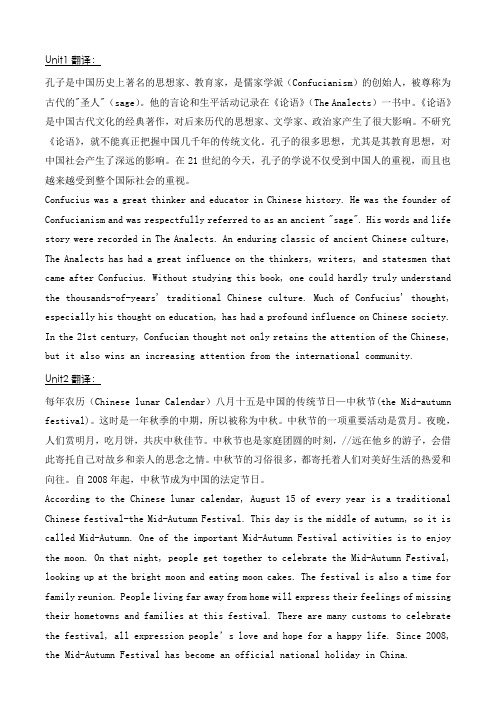
孔子是中国历史上著名的思想家、教育家,是儒家学派(Confucianism)的创始人,被尊称为古代的"圣人"(sage)。
他的言论和生平活动记录在《论语》(The Analects)一书中。
《论语》是中国古代文化的经典著作,对后来历代的思想家、文学家、政治家产生了很大影响。
不研究《论语》,就不能真正把握中国几千年的传统文化。
孔子的很多思想,尤其是其教育思想,对中国社会产生了深远的影响。
在21世纪的今天,孔子的学说不仅受到中国人的重视,而且也越来越受到整个国际社会的重视。
Confucius was a great thinker and educator in Chinese history. He was the founder of Confucianism and was respectfully referred to as an ancient "sage". His words and life story were recorded in The Analects. An enduring classic of ancient Chinese culture, The Analects has had a great influence on the thinkers, writers, and statesmen that came after Confucius. Without studying this book, one could hardly truly understand the thousands-of-years' traditional Chinese culture. Much of Confucius' thought, especially his thought on education, has had a profound influence on Chinese society. In the 21st century, Confucian thought not only retains the attention of the Chinese, but it also wins an increasing attention from the international community.Unit2翻译:每年农历(Chinese lunar Calendar)八月十五是中国的传统节日—中秋节(the Mid-autumn festival)。
- 1、下载文档前请自行甄别文档内容的完整性,平台不提供额外的编辑、内容补充、找答案等附加服务。
- 2、"仅部分预览"的文档,不可在线预览部分如存在完整性等问题,可反馈申请退款(可完整预览的文档不适用该条件!)。
- 3、如文档侵犯您的权益,请联系客服反馈,我们会尽快为您处理(人工客服工作时间:9:00-18:30)。
Theme exploration
1 Which three of the following qualities most characterize the spirit of sports? Why? courage / teamwork / fun and joy / commitment / fair play and honesty / character development / excellence in performance
Tips
Teamwork: Individuals can be stronger in a team.
Fair play and honesty: Individuals can be stronger in a team.
Language focus
Practical Phrases
把……抛在后面 短语逆译 leave sth. behind
短语应用
随着七天长假的临近,许多人都准备离开城市, 到广阔的乡村旅游。
意群提示
(at hand / to leave the city behind / head into )
句型提炼
Language focus
Functional patterns
句型提炼
When sb. asserted his intention to do sth., other people reacted with …
应用提示
用于表达“当某人明确表示自己要做某事 时,其他人的反应”。
句型应用
Language focus
Practical Phrases
直到现在;至今 短语逆译
to this day
短语应用
直到今天,白求恩同志依然是我们整个社会学习的榜 样,因为他的崇高精神已经成为我们的精神财富。
意群提示
(To this day / a role model / the spiritual asset of Chinese nation) To this day, Comrade Bethune remains a role model for the whole society to follow in that his holy spirit has become our spiritual asset
Language focus
Practical Phrases
Practical Phrases
1. up to 2. in attendance 3. leave sb./sth. behind 4. fall ill 5. have no intention of doing sth 6. endear sb. to sb. 7. to this day
Tips
2 What values do you think people can cultivate by playing sports?
Tips
3 Do you think winning is the most important thing in sports? Why or why not?
句型提炼
Language focus
Functional patterns
句型提炼
With sth. we can ….
应用提示
用于表达“达到目的所需要的条件”。
句型应用
Language focus
Functional patterns
典型例句
十年的婚姻生活使他明白了一点:只有彼此宽
容与体贴,才能分享欢乐与幸福。
Meanings
达到;至多 出席 把……抛在后面; 生病 不打算做某事; 使受欢迎;使被喜爱 直到现在;至今
Language focus
达到;至多
Practical Phrases
短语逆译 up to
短语应用
奥林匹克体育场将可容纳多达8万观众。
意群提示
(up to / Olympic Stadium/spectators ) The Olympic Stadium will hold up to 80,000 spectators.
意群提示
(tolerance and consideration / share in )
Ten year’s marriage life made it clear for him that with tolerance and consideration towards each other people can share in joy and happiness.
使受欢迎
Practical Phrases
短语逆译 endear sb. to sb..
短语应用
他的体贴和慷慨使他深受同事们的喜爱。
意群提示
(consideration and generosity / endeared him to ) His consideration and generosity endeared him to his colleagues.
Language focus
Functional patterns
原句译文
直到今天,克里夫 . 杨依然是一个伟大的 标杆和辉煌的榜样,他向世人表明普通人
也能凭潜在的能力取得非凡成就。
逆译练习
To this day, Cliff Young remains a magnificent reminder and brilliant example of how ordinary individuals can
应用提示
用于表达“某人树立的榜样精神”。
句型应用
Language focus
Functional patterns
典型例句
直到今天,雷锋同志依然是一个辉煌的标杆和杰 出的榜样,他向世人表明一个普通人也能为我们 的社会做着不平凡的贡献。
意群提示
(glorious / outstanding unusual contribution )
Language focus
Language appreciation
Language focus
Language appreciation
Language focus
Language appreciation
Language focus
Language appreciation
Critical thinking
Language focus
Functional patterns
典型例句
当这医务工作人员表示他们准备用自己的生命换 得大众的健康时,公众先是表现出惊讶,继而予 以敬佩。
意群提示
(medical workers / the public health)
When these medical workers asserted their intention to give their lives for the public health, the public reacted with surprise and then with respect.
生病
短语逆译
fall ill
短语应用
研究人员发现当面对紧张工作和生活压力时, 性格开朗的人生病的几率较小。
意群提示
(a cheerful disposition / were less likely to / fall ill )
Researchers found that people with a cheerful disposition were less likely to fall ill when facing the pressure from the stressful work and life.
With the seven-day holiday at hand, many people are planning to leave the city behind and head into open country for relaxation.
Language focus
Practical Phrases
inherently achieve remarkable results. (Para.14, L1)
句型提炼
Language focus
Functional patterns
句型提炼
To this day, sb. remains + adj. + reminder and + adj. + example of how ….
Language focus
不打算做某事
Practical Phrases
短语逆译 have no intention of doing sth.
短语应用
一旦陷入困境,聪明的人不会一味地钻牛角尖,而 是适时地另辟溪径以谋求出路。
意群提示
(stuck in a dilemma / has no intention of/ to find his way out )
Functional patterns
原句译文
有坚定的决心和充分的准备,我们就能取
得荣耀,也能成为别人的光辉榜样。
逆译练习
With determination and preparation, we can achieve distinction and be a brilliant example to others.(Para.14, L3)
Once stuck in a dilemma, a wise man has no intention of heading blindly for a dead end but reverses his course in time to find his way out.
